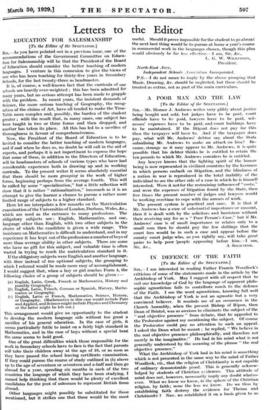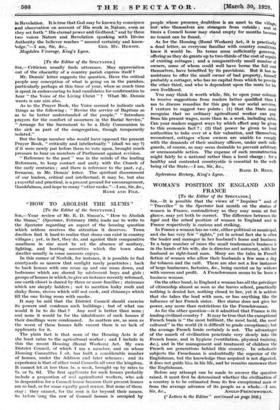IN DEFENCE OF THE FAITH
[To the Editor of the SPECTATOR.]
am interested in reading Father Francis Woodlock's criticism of some of the statements made in the article by the Archbishop of York. May I suggest with all respect that to veil our knowledge of God by the language of apparent philo- sophic agnosticism falls to contribute much to the defence of the Faith. I use the word agnosticism, knowing full well that the Archbishop of York is not an agnostic but a very convinced believer. It reminds me of an occurence in the Church Assembly, when the present Bishop of Ripon, then Dean of Bristol, was so anxious to eliminate the subject of the " real objective presence " from debate, that he appealed to the Prolocutor against my mentioning the subject. Of course the Prolocutor could pay no attention to such an appeal. I asked the Dean what he meant ; he replied, " We believe in the real objective presence philosophically, and therefore not merely in the imaginative." He had in his mind what is not generally understood by the meaning of the phrase " the real objective presence."
What the Archbishop of York bad in his mind is something which is not presented in the same way to the mind of Father Woodloek, viz., that the religion of Christianity is not capable of ordinary demonstrable proof. This is generally acknow- ledged by students of Christian evidences. This attitude of mind does not, however, necessarily imply any doubt whatso- ever. What we know we know, in the sphere of the Christian religion, by faith ; none the less we know. Do we thus by establishing faith destroy the evidence for Theism and Christianity Nay, we established it on a basis given to us in Revelation. It is true that God may be known by conscience and observation on account of His work in Nature, even as they set forth " His eternal power and Godhead," and by these two voices Nature and Revelation speaking with Divine Authority the believer reaches " assured certainty and know-



















































 Previous page
Previous page